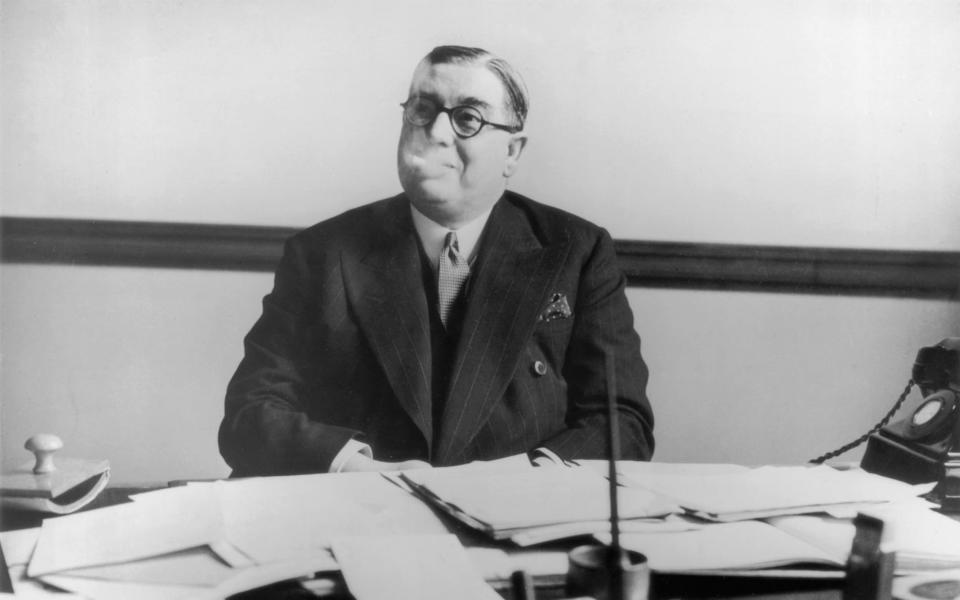The Pink Sink, sex ‘crimes’ and the MPs who fought against appeasement

‘Humming with intrigue” was Chips Channon’s description of the House of Commons in the spring of 1938. Nothing could have pleased the gossipy politician more. The intrigue’s source, he claimed, was a single group, “the so-called ‘Insurgents’… rushing about, very over-excited.”
Channon’s “insurgents” were Members of Parliament opposed to Neville Chamberlain’s policy of appeasement of Nazi Germany, under the leadership of “warmongering vulgarian” Winston Churchill. Among them was a loose-knit fraternity, labelled by the Daily Mail in June that year “the ‘glamour boys’ of the House of Commons… seven or eight youngish members of Parliament, nearly all of them good-looking”.
“Glamour boys” was not intended as a compliment. It was not the Mail but Chamberlain’s sinister head of the Conservative Research Department, Joseph Ball, who coined the term. As Chris Bryant explains, as descriptors go, in the late Thirties “glamour boy” was decidedly fragrant: “it insinuated something disturbing… the implication of deviancy was subtle”. This group, who are the focus of Bryant’s book, were bachelor MPs united not only by mistrust of Hitler, but their sexuality. Each of the subjects of this sprightly biography was gay or bisexual, or, as the author insists, “queer or nearly queer”.
Bryant, who is the current Labour MP for Rhondda, makes hefty claims for his subjects. “Without them we would never have gone to war with Hitler, Churchill would never have become prime minister and Nazism would never have been defeated.” Readers must make up their own minds how far to accept or qualify so blunt an assessment. Its lack of nuance is not typical of Bryant’s book as a whole, and almost certainly not a claim his subjects – Rob Bernays, Ronald Cartland, Bob Boothby, Victor Cazalet or Jack Macnamara – would have made for themselves. All were steeped in an old-fashioned rhetoric of public service that they embraced with marked earnestness. “We cannot escape the fact that we… have given in to force,” a disillusioned and disapproving Macnamara told his local newspaper in the aftermath of Chamberlain’s acquiescence in Hitler’s annexation of the Sudetenland.
Bryant’s “glamour boys” are distinguished by a straightforward desire to behave honourably in their public mission. Given their society’s disdain for men of their proclivities, it’s ironic how often and how easily they occupied the moral high ground. Bernays, Cartland, Cazalet and Macnamara were all killed on active service in the Second World War. “The protection of the Jews was now a moral imperative for the Glamour Boys,” writes Bryant, of 1938, and The Glamour Boys is two books in one: an account of the “moral imperatives” of a group of energetic young, mostly Conservative politicians in a period before cynicism corroded concepts of authority and the political agenda; and a survey of (often illegal) gay nightlife in London and Berlin between the wars.

Bryant reminds us that this was “a world where a wink or a tender glance could get you arrested”. The 50-year-old Criminal Law Amendment Act still held sway. Anything a court chose to interpret as “gross indecency” between two men carried a sentence of two years with hard labour and certain public obloquy, even if the “indecency” in question was committed in private or indeed only implied in written communication. In London in 1937 there were 251 prosecutions of such “gross indecency”. If sex with another man was on a Glamour Boy’s agenda, as Bryant assures us it was, it was a decidedly dangerous hankering. Safer were the fleshpots of interwar Berlin, a city of marked sexual permissiveness visited by most of Bryant’s subjects in the decade before hostilities began.
It’s understandable that these two books-within-a-book don’t knit completely. The seriousness of the risks of male homosexuality meant the Glamour Boys avoided committing to paper any record of what Bryant characterises as the “cocktails and laughter” side of their lives. Implicit in the Ball/Chamberlain taunt “glamour boys” and integral to Bryant’s study, their “queerness” is frequently buried somewhere between the lines in carefully edited personal archives (in the case of Ronnie Cartland, for example, his redoubtable sister, the romantic novelist Barbara Cartland, destroyed many of his papers). Evidence of their sexuality is thinner on the ground than accounts of their working lives; for this reason, none of them emerges from his account as fully three-dimensional. Bryant enjoys all his material: his colourful snapshots of camp drinking dens, including the basement bar of the Ritz known as the “Pink Sink”, as well as his account of manoeuvrings within Parliament.
Quite rightly, there is a shocking quality to his picture of British anti-Semitism, trumpeted unabashedly in the smaller newspapers and an idée fixe for a certain sort of older politico. As early as 1932, returning from Germany, Bernays wrote that he was in “no doubt that the drive against the Jews is increasing in ferocity” as Hitler’s support base spread. Many at home would take some time to come around to this view. By then, of course, it was too late. Equally shocking is Bryant’s reminder of the pressures faced by gay men in this period, the very real dangers of discovery in a harshly unforgiving climate. Bryant invests his forgotten cast with heroism, proof of the grit, determination, bravery and resourcefulness lurking behind exteriors frequently written off as “flamboyant”.
The Glamour Boys by Chris Bryant is published by Bloomsbury at £25. To order a copy for £19.99, call 0844 871 1514 or visit Telegraph Books

